
What is OpenCV?
OpenCV is stand for Open Source Computer Vision Library.OpenCV is an open source computer vision and machine learning software library.openCV devloped by intel.OpenCV is a cross-platform library using which we can develop real-time computer vision applications. It mainly focuses on image processing, video capture and analysis including features like face detection and object detection. In this tutorial, we explain how you can use OpenCV in your applications.
History
Officially launched in 1999 the OpenCV project was initially an Intel Research initiative to advance CPU-intensive applications, part of a series of projects including real-time ray tracing and 3D display walls.[4] The main contributors to the project included a number of optimization experts in Intel Russia, as well as Intel’s Performance Library Team.
In August 2012, support for OpenCV was taken over by a non-profit foundation OpenCV.org, which maintains a developer and user site.
In May 2016, Intel signed an agreement to acquire Itseez, a leading developer of OpenCV.
In July 2020, OpenCV announced and began a Kickstarter campaign for the OpenCV AI Kit, a series of hardware modules and additions to OpenCV supporting Spatial AI.
Features
- Open-source
- Fast Speed
- Easy to Integrate
- Ease of Coding
- Fast Prototyping
Written in Which Language
The library is written in C and C++
Architecture of OpenCV

Alternative of OpenCV
- Microsoft Computer Vision API
- Amazon Rekognition
- G2 Deals
- Google Cloud Vision API
- scikit-image
- Azure Face API
- SimpleCV
- Deepdream
- IBM Watson Visual Recognition
- Clarifai’s
- DeepPy
Interview Question and Answer
Best Resources, Tutorials and Guide
Best Courses and Insitute for learning
If you want certification course for such top course. So please visit “DevOpsSchool.com”. You will find more certification courses here.

I’m a DevOps/SRE/DevSecOps/Cloud Expert passionate about sharing knowledge and experiences. I am working at Cotocus. I blog tech insights at DevOps School, travel stories at Holiday Landmark, stock market tips at Stocks Mantra, health and fitness guidance at My Medic Plus, product reviews at I reviewed , and SEO strategies at Wizbrand.
Please find my social handles as below;
Rajesh Kumar Personal Website
Rajesh Kumar at YOUTUBE
Rajesh Kumar at INSTAGRAM
Rajesh Kumar at X
Rajesh Kumar at FACEBOOK
Rajesh Kumar at LINKEDIN
Rajesh Kumar at PINTEREST
Rajesh Kumar at QUORA
Rajesh Kumar at WIZBRAND

 Starting: 1st of Every Month
Starting: 1st of Every Month  +91 8409492687
+91 8409492687  Contact@DevOpsSchool.com
Contact@DevOpsSchool.com
